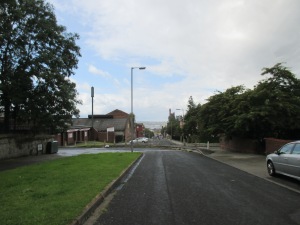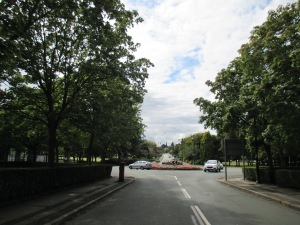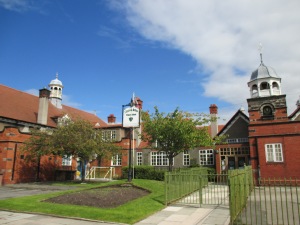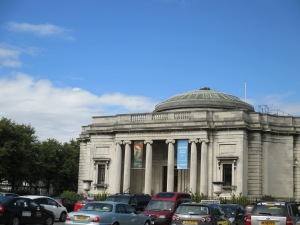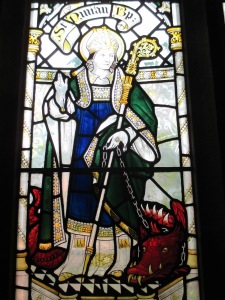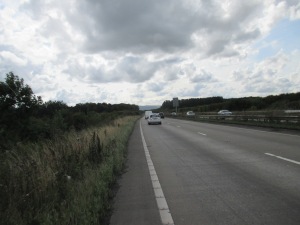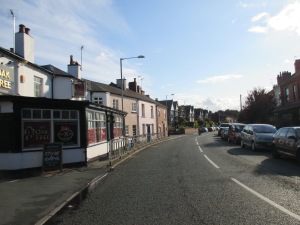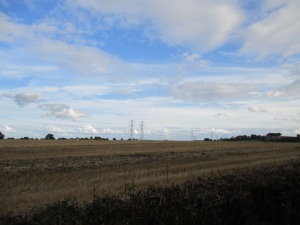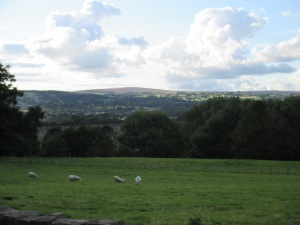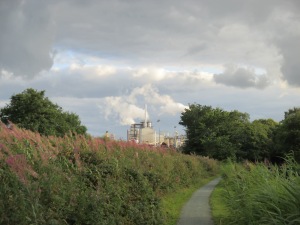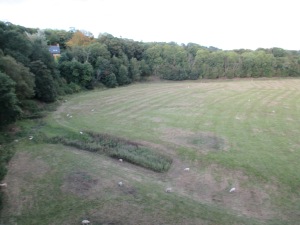‘And then I came back to Wrexham. And the streets were clean! And the buildings weren’t falling down. And there were no lepers on the street corners, taken out by organised criminals and left there all day without water.’ – Sandra, Chirk.
Fear makes us feel alive. Think about that little daily dose of terror provided by newspaper headlines. The terrorists, global epidemics, sex criminals and looming military invasions that each day are reported as immediate dangers to our comfortable lives. There’s a surge of adrenaline, a threatening figure on the horizon with malevolent intentions. Teeth start to bare, the mind races with tenuous analogies to ‘jungle warfare’ and ‘survival of the fittest’. Turns out social mobility, welfare or the right to a fair trial were luxuries that this nameless, faceless horror might steal from us: let’s remove them ourselves. It’s as if we’re supposed to enjoy this ‘pure’ or ‘natural’ state. Nature’s had such different meanings in different eras, and its status now makes me uncomfortable. I myself prefer the soppy and gushing lyrics of the Romantics. The Ancient Mariner, Ozymandias or Endymion didn’t harangue us with shrill terrors about benefits cheats, travellers or irresponsible single mothers.
As I travel through Liverpool, or the Lakes, or the Highlands, Lowlands, North, East or Midlands, fear is the mood music. News companies have taken over some of the roles of the Church, providing a regular service of sin, hellfire, heathens and atonement that unites communities in a shared set of fears and concerns. The effect establishes a single currency of communication, talking about a constructed narrative of recent news whilst uniting everyone in a shared belief in its importance. A shared belief in the ‘news’ causes people everywhere to talk about similar things. My mind’s starting to attune more rapidly to the clichés and lack of originality in people’s thinking that stem from this, and the effect is, to be honest, exasperating. I’m losing the hunger to talk to strangers so readily, the conversations becoming predictable. The headlines of the newspapers are far more influential than even their content. In pubs, caffs and supermarket queues, these terrifying stories provide a shared narrative of unresolvable problems. They lend importance to the affairs of faraway lands or improbable events, and lift scrutiny or interest from the difficulty of making choices in our own lives. Fear makes us prepared to live, and able to obstruct the pressures of living.
What does all this mean for the underlying argument for more complex and direct democracy that this project is interested in? Well, calls for universal suffrage, old age pensions, or contractual obligations to employees like sick pay or fixed hours were made always prematurely, against the grain. Democracy and citizenship are not universal achievements but antagonistic demands, as academic political theorists have argued enough already. I’m starting to wonder if the kind of democratic political structure I’m starting to think the details through is necessarily impossible, too idealistic. But would James Maxwell or John Logie Baird have abandoned their plans to produce a technology or test an obscure hypothesis that contradicted scientific understanding because it had never been realised before, or because producing it would be immensely difficult at first? No, and like light or media, they transformed our way of seeing and became normalised.
My mind’s fizzing with these thoughts as I pack up my clothes and belongings in Wavertree, Liverpool. Today I start a new chapter in this journey, travelling over into Wales. I have very little accommodation set and my route feels more plastic now than at any point. I’m excited by what lies ahead. I wave Sandra goodbye, then head out through Toxteth, Liverpool Eight, an area that demonstrates in large part the effective work of the Militant Labour council, who rebuilt the area with pleasant low-rise houses with gardens, removing the awful systems-built cheap high-rises that still blight other major cities like Birmingham today. There’s obviously unemployment here, and it’s a low-income area that’s revealing its frays in the tatty front windows and derelict shops here and there, but there’s no obvious sign of other social problems.
I pass Princes Park, a pretty Victorian creation, then head back towards the docks, passing the large Cains Brewery complex, a rusty and dusty old thing now locked up for the foreseeable future. I ride back through the centre and cycle through Albert Dock, taking time to have a look round the Museum of Liverpool just by the Mersey. It’s a free museum built in the generic high-budget postmillennial public catalogue style of a silver spaceship with huge and irregular glass windows, a building that concedes far too much to style and space and little to content or depth, one that could in Berlin, Bergen or Beijing. The museum is large, accessible and welcoming, and akin to Glasgow’s People’s Palace in its intentions and presentation: family-friendly, multi-media driven, not particularly academic. There’s an exhibition on the ‘People’s Republic’ of Liverpool worth popping in for, with a reasonable gloss of the city’s cultural history and some interesting short films about ‘gangs’ and the city’s historic socialist identity and rebellious defiance.
I take the Mersey ferry over the wide river. A pre-recorded voice describes the skyline before playing Gerry and the Pacemakers’ paean to this grey and murky expanse. It’s the tourist option (and the cyclist’s too), costing around a fiver, and the boat languorously drifts along the river-line at each end before pulling in eventually at Seacombe, which also happens to be an unlikely spaceport, or so it advertises itself to bored children and exhausted parents. Most of us disembark. On the other side is Birkenhead, a sluggish spread of small warehouses, dilapidated clock-towers and the creaking vestiges of industry, flanked in bursts of buddleia and cheap car-wash forecourts. There’s not much I see of Birkenhead, and I cycle through the Wirral, past places like Rock Ferry, New Ferry, Bromborough and Eastham, rings of suburbia that increase in affluence as one leaves Liverpool. These areas with their indistinct architecture and neighbourhood design, familiarity of small supermarkets, petrol stations, post offices and Asian takeaways, are places one could completely disappear within, fester or ferment. So long as one has money, one will not be troubled. But this is nothing distinct to the Wirral.
I pass through one curious place, Port Sunlight, a model worker’s village built by the Lever Brothers to house and provide for the workers of its soap factory. Besides a large new soap-works, William Lever built a gallery, school, hospital, concert hall, swimming pool, church alongside around eight hundred homes, built with little expense spared in crafting them. A mixture of materials were used and study one block long enough, and one will find plenty of small details of craftsmanship. Each block of houses was designed by a different architect to ensure an originality and plethora of styles, and the back of each house cannot be seen from the street, thus providing for privacy. Then there are the wide open expanses of green lawns, the rows of trees, and the spaciousness of the place: Lever gets something very right about built design that most urban planners and builders of the 20th century did not.
Lever’s intentions were also openly paternalistic. Rather than raise the wages of his staff, something he expected they would fritter away on alcohol or luxurious food, he invested the profits into the houses and facilities of the village. His aims were ‘to socialise and Christianise business relations and get back to that close family brotherhood that existed in the good old days of hand labour’. It’s an illusion, but one which has led to the construction of a very interesting place. Compare it to Bourneville or Saltaire, and one notices the lack of pubs, the increasing desire to manage and control the lives of workers outside the factory, but on the other hand, a belief in the rights of workers and their families to a good quality of life, and of an employer’s duty in providing for that outside the factory walls. Work was more than just a job.
Today the place feels like a large and twee museum. There ought to be fresh lemonade served in jugs, croquet on the lawns, good old fashioned British fun. Lever’s notions were always steeped in a mythic Victorian idea of the communities of the past which we still retain to a degree, in the desire of city professionals to ‘go back to the country’, a place they’ve never understand, or Prince Charles’ lunges towards neoclassical design in places like Poundbury. Tourists mill around, some ask me for directions. I have no idea how this place birthed the eccentric English pop star Pete Burns, but the bitter, introspective and intoxicated landscapes of suburbia are always the most intriguing of all, and if anything can be, most indicative of a collective psyche. I cycle on, passing by the early 20th century residential mazes of Ellesmere Port, eventually reaching the town of Chester.
It’s obviously an affluent place, and makes its point well with a costume of opulent suburbia upon entry that, unlike most other towns, clearly looks like it wants to be there. Entering the town itself is easy, as it’s relatively small. The town’s walls are less impressive or extensive than rumours have suggested, but in all the place seems like a pleasant and small market town. I arrive into a pedestrianised zone between Chester Cathedral, an impressive town hall and a McDonalds. People sit in the square eating packaged sandwiches and reading the Daily Mail. There’s a good deal of mock-Tudor about, including one building with the risible confession of its birthdate, 1888. The streets are thronged with tourists wandering up and down besides the jewellery and fancy clothing stores. One’s not likely to find a Poundstretcher here.
I pop into the large cathedral and glance up at the impressive stained glass in the corridors. I read one moving dedication to Mollie, who died aged 2 in 1917: ‘All you had hoped for, all you had, you gave.’ The cathedral is rather gloomy and otherwise unadorned, and lit up mainly with the chatter of American tourists taking photographs. ‘Look I spent my first British pounds!’ I head out and talk a while to a postgraduate English student on a bench, a young woman who tells me about her enjoyment of the town compared to the south-east, its friendliness as a place, and the surprisingly cheap rents here. All good. I wander on through a series of very busy shopping streets, admiring the cheeky mock-Tudor details and glancing up for the occasional neat surprise, like two small statues bearing slogans, ‘the profit of the earth is for all’. Further down, an ex-soldier still dressed in military fatigues busks a living in singing ‘How Great Thou Art’ to Chester’s indifferent shoppers.
I spy one old fellow with a well-kept beard giving out booklets to passers-by. He speaks to them in a mumble which is hard to follow, but the Mersey fuzz stands out. I suspect he’s used to being ignored. I decide to talk to him. His name is Eddie, and he’s giving out small booklets that condense stories from the Gospels. He hands me one. ‘You’ll like this, it’s got a happy ending’. He tells me that he was ‘born again’ forty years ago, that he lives in Wallasy by the river Mersey, and that he does this all the time. He’s happy to talk to me and has a gentle way about him, nothing preachy at all. He tells me of how he let God into his life.
‘Me dad used to whack us with the belt, and me ma wasn’t far behind. The fear, fear of the darkness … I was a drunk, a womanizer, I was violent … I had a mate at work in this car factory, he used to always hammer on about the gospels, I’d never heard it before, but I wasn’t listening’.
Then something changed in him, slowly and by degrees. Another friend invited him one time to come to his church.
‘And I was listening to him [the priest], and I was just stunned. I was looking down by the end, at the darkness in me, at the love of the Lord. … And me mate, he brings me to talk to the priest by the end… Dan, it was like a spiritual experience … he said, do you want to be a Christian? And I felt that darkness coming out of me, pulling out of me, and I had Jesus in my heart.’
He talks of his surprise that people travel all over the world ‘in search of God’, through ‘comparative religions’ as he puts it. ‘Jesus, he’s here all along, he’s inside’.
Though I still doubt the veracity of religious claims about the afterlife, or the nature of the universe, I don’t doubt the veracity of those lived feelings which religious belief makes possible and atheism does not. The veracity of those claims isn’t even particularly important, more the effects it induces in those believers. I still find myself marvelled by faith, altruism or indifferent love in all its religious guises, and consider them positive things in all.
I take a look at the remains of a Roman ampitheatre recommended by the postgrad student, then head out over the River Dee. I make a misjudgement here and follow what turns out to be a very busy A-road south, a ten mile sprint over the border and into Wales, heading towards Wrexham. The hard shoulder is strewn with crash debris and the remains of ossified animals. Entrance into Wales is marked by new bilingual traffic signs twice the size of English ones, and a whole new language I seek to understand.
I reach Wrexham quickly enough. It’s a town that feels a little larger than Chester, with a university and small retail park outside, and a neat and unpretentious town centre in its interior. Most of it seems to have been built between the middle and late 20th century, with an unusually large number of pubs. Most shop premises seem to be occupied, and there’s thankfully no oversized mall, unlike most of the English towns I’ve been passing recently. I spy the large steeple of grand St. Giles’ Church, which someone from the Welsh Tourism Board I suspect has labelled one of the ‘seven wonders of Wales’. It’s impressive, and by comparison the remainder of Wrexham seems to have been built recently and for a quick, functional end.
I talk to Mr and Mrs Roberts, an elderly couple sitting down by a wall. I ask them about the road signs. Mr Roberts can speak but not read Welsh, whilst Mrs Roberts cannot (this is how they introduce themselves). They tell me that national pride is not something felt particularly strongly here given the proximity to England, though I already notice the shift in accents, with that fluctuating intonation that marks out a Welsh accent over an English one, albeit mild here. I ask them about the Fat Cat pub, a boozer which my partner’s grandfather was a regular patron of until it closed down. With no willing relative to take his farm on, he sold the land and largely spent the proceeds enjoying himself in the centre of Wrexham. He’s still alive now and a wonderful old fella. The pub was situated right between the bus station, betting shop and supermarket, everything a retired man needs, but my dream of popping in to see the place is dashed.
Instead I head into the Elihu Vale, the town’s populous Wetherspoons pub. Wrexham FC shirts hang from the walls, and the bar is busy with late-middle-aged to retired men, most solitary and sullen, some looking a little ill. Coins fall into the fruit machine behind me, men pick at their phones and then at their noses, many with an expression of mild worry. A pint of Sneck Lifter brings me to a similar state.
I talk to two young men outside about the town, Wales and its borders, but they are evasive and unsuggestive, and I’m starting to feel a sense of struggle and stiflement about the place. It feels dulled, deprived of fresh air, heavy, sluggish. There are tacky nightclubs, retail parks and bad takeaways. I explore further, losing myself in suburbs of new housing, and eventually reach my fill.
I head out south, pushing deeper into that central and depopulated tract of the east of Wales that few would struggle to name a place in. I pass through the villages of Newbridge and Pentre, then along Llangollen canal, busy with canalboats and a pleasure to ride along, the path smooth and the afternoon dry and warm. I reach the outskirts of Chirk, the smoky chimneys of the Kronospan chipboard factory burning in the distance, and pass its marina filled with holiday canalboats, then pass through two very long and spooky tunnels where I either graze my head against the wall or veer too near the edges of the dark fence, teetering on the edge. One misjudgement and I’d fall into the dark waters below. Who would hear my scream? The second tunnel by Chirk is a quarter of a mile long, and certainly unwise to cycle through, as I do. At the other end I discover some kids fishing and talking, but unable to see them for most of the ride, their echoing chatter has a chilling and spooky effect on me.
The canal takes me over a spectacular viaduct and into the village of Chirk Bank, just back over the border in England. It’s a small land of bungalows, sleepy and content with itself. I’m staying here with Ken and Sandra, my partner’s aunt and uncle-in-law. As I arrive, they welcome me in, and Ken shares memories of Manchester, a city he worked in for many years in the city architect’s office. He’s now 88 though looks at least fifteen years younger. He tells me of cycling across France, but the arrival of the bike and touring brings back bittersweet memories.
Sandra’s a retired nurse, and our conversation of travel has her talking about her work in Calcutta as a volunteer for Mother Teresa. She describes in detail the destitution of the people they would see and treat, and of the very basic standards of living she witnessed. She recalls at the same time the immense corruption in its government, of the city’s metro system with TVs on trains that no-one could afford to use, and the huge cars and houses of government members, compared to the crumbling roads, the leper colonies, and the TB clinics like that she worked in. It leads to a pessimistic and worried reflection on the world at the moment. ‘It seems like things are just getting worse and worse’, as new conflicts open and the UN fails to intervene. Things feel like they’re in between.
Perhaps fear makes us live, but it’s hope and pleasure that energise us most of all. We talk about the beaches of Wales which, with the tips I’ve being picking up today, I hope to explore. Sandra loves to walk on the beach, words of poems always unwritten floating through her thoughts. She connects it back to her faith as a practising Christian, another recurrent motif of today. ‘One of my teachers called me a ‘pagan Christian’! I don’t mind, you know, God is love, God is in all things.’ Pleasure and beauty can rich and enable belief, something I find more stirring than all the cobwebs, gloom and tourist bumf of cathedrals like Chester’s. She paraphrases William Morris:
‘If you want a golden rule that will fit everybody, this is it: Have nothing in your houses that you do not know to be useful, or believe to be beautiful.’
We eat a meal together, drink wine and talk for a long time, catching up and enjoying where the conversation leads. Ken reflects on old age, and of the declining abilities of the body against the memories of one’s achievements and previous capabilities. It is a melancholy reflection, one rarely heard or confessed but privately felt in the process of ageing, an increasingly isolated experience in a popular culture that over-values youth and youthfulness from employment to fashions. Though Sandra’s a little younger than Ken, both discuss their differences as things that work in combination to a single happy relationship. ‘We always said we’d never marry! Well never say never.’ There’s something really nice about spending time with people truly committed to spending their years together and sharing two lives as one.
They retire to bed, and I take a shower and reflect a little deeper than usual on this trip. This shower with its gentle gradients of heated water. Ken’s mother and her tin bath, Sandra’s family growing up and living on a farm where water was pumped from a well. Internet that connects my laptop device and phone to the rest of the world. The clothes, gadgets, internet maps, deodorants and ointments that make this travelling possible. I could read what I want, hear an extraordinary piece of music or see a work of art. Tonight, like most times, I just want to know what my friends are up to. The past and the future seem like abstract concepts, human attempts to explain a lived experience more colourful, complex and fuzzy than the current confines of language. Something’s changing in me about this next leg of this journey, which I can’t yet articulate. Cycle on.











